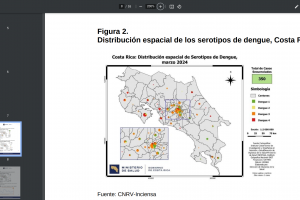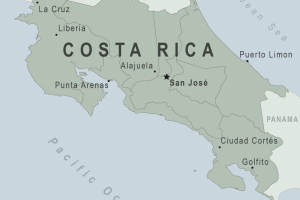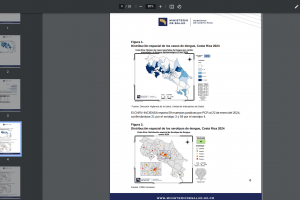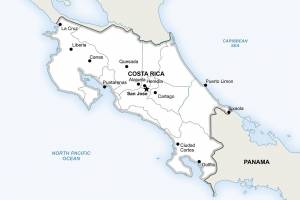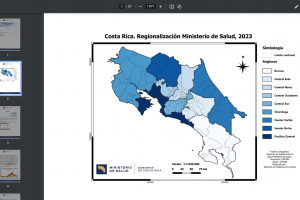Costa Rica Travel Vaccines
Costa Rica Travel Vaccines 2024
International visitors may be exposed to infectious diseases in the Republic of Costa Rica. The health risk of becoming infected with chikunguna, Dengue, Malaria, or Zika varies by location and vaccination status in Costa Rica. The Health Department's latest Boletín Epidemiológico N°12 was posted in April 2024. The World Health Organization publication PAHO/WHO International Travel Vaccination lists vaccine options. As of April 26, 2024, Canada, the United Kingdom, and the U.S. CDC have issued travel vaccination advisories when visiting Costa Rica, such as dengue.
Costa Rica Chikungunya Vaccine
As of April 2024, 7 chikungunya vaccine had been approved in Costa Rica this year. However, Valneva SE's IXCHIQ® vaccine is Approved in the U.S. There were 82 chikungunya cases confirmed in Costa Rica in 2023.
Costa Rica Dengue Vaccine
In April 2024, Costa Rica confirmed that dengue fever is classified as high risk due to increased infections of classic and hemorrhagic. As of April 2024, over 6,437 dengue cases were confirmed in Costa Rica. During 2023, there were 24,914 dengue cases, a significant increase from the 7,485 dengue patients reported in 2022. As of March 2024, the Dengvaxia® vaccine was sold in private pharmacies in Costa Rica for around $130. The QDENGA® dengue vaccine is not offered in Costa Rica.
Costa Rica Hepatitis Vaccines
Various hepatitis vaccines are available in Costa Rica in 2024. According to data from the Health Surveillance Directorate, the total number of hepatitis A cases during 2024 is 156, with 2,309 cases registered in 2023 and 323 in 2022.
Costa Rica HIV
As of March 2024, there are no HIV vaccines available in Costa Rica. In Costa Rica, preliminary data from the Health Surveillance Directorate report a total of 816 cases of HIV-AIDS as of November 10, 2023, of which 685 are men and 130 women, with the majority of these cases concentrated in the age group 25 to 29. The provinces with the most reported cases are San José, with 259, and Alajuela, with 119. During the year 2022, a total of 857 cases of HIV-AIDS were registered.
Costa Rica Influenza Vaccines
In 2024, Costa Rica offers flu shots. The country has developed a national pandemic plan for avian influenza and other respiratory viruses.
Costa Rica Leprosy
Costa Rica reported over 677 cases of leprosy in 2023.
Costa Rica Malaria Vaccine
In 2024, neither WHO-approved malaria vaccine is available in Costa Rica. During 2024, there have been 84 malaria cases confirmed in Costa Rica. In 2023, there were 544 confirmed cases of Malaria. In 2022, about 406 locally acquired malaria cases were ported. Costa Rica's Ministry of Health has implemented a treatment strategy for Malaria, especially in low-lying zones. In April 2024, 65 collaborators from the Ministry of Health belonging to the Integrated Management of Vector Control Program of the Huetar Caribe Region participated, where 870 homes were visited, and malaria treatment was delivered to 1,990 people.
Costa Rica Measles Vaccine
In 2024, MMR vaccines are offered in Costa Rica. The Ministry of Health confirmed one case of measles in San Josecito de San Rafael de Heredia (San Jose), which was detected on January 11, 2024. Another measles case was confirmed in 2023.
Costa Rica Yellow Fever Vaccine
A yellow fever vaccination (YF-VAX or Stamaril) is required when visiting Costa Rica when arriving from South America and/or sub-Saharan Africa. Additionally, an official certificate (ICVP) must be presented at the airport when entering Costa Rica. Geographical zones at risk of yellow fever transmission were updated in June 2023.
Costa Rica Zika Vaccine
There have been 12 Zika cases confirmed in 2024. In 2023, 40 confirmed cases of the Zika virus were reported in Costa Rica. No Zika vaccines are available in 2024.
Costa Rica Travel Alerts
In 2024, the U.S. Embassy in Costa Rica and the U.K. NHS issued malaria alerts. The U.S. Department of State has issued a Level 2: Exercise Increased Caution for the Republic of Costa Rica. The U.S. Embassy in San Jose published the February 2024 Edition on critical topics important to the U.S. Citizen community in Costa Rica. The embassy advises U.S. citizens of increasing crime levels in San Jose. It suggests enrolling in the Smart Traveler Program to receive emergency alerts, as do Australia, Canada, and the United Kingdom. The U.S. Customs and Border Protection signed a Joint Statement of Cooperation in August 2023 to formally initiate negotiations to include Costa Rica among the Global Entry foreign partner countries. Global Entry is one of the U.S. Department of Homeland Security's Trusted Traveler programs, and successful applicants also receive the benefit of the Transportation Security Administration's PreCheck® program.
Costa Rica Tourist Information 2024
Costa Rica is located in Central America, bordered by the Atlantic and Pacific Oceans, Nicaragua, and Panama. It is politically divided into three levels: 7 provinces, 81 cantons, and 463 districts. And San José is the capital city. Costa Rica's Juan Santamaría International Airport, part of the VINCI Airports network, welcomed over 2.8 million passengers during the first half of 2023. This represents a 4.3% increase compared to 2019. As the Instituto Costarricense de Turismo reported, this total includes 792,944 visitors from the United States and 148,973 from Canada. Canada and the U.S. remained very popular transit sites in 2023.
Since 2022, the USD has lost over 25% of its value against the Costa Rican Colon. According to data, Costa Rica's inflation rate in 2022 was 8.2% but decreased to 0.66% in 2023.

